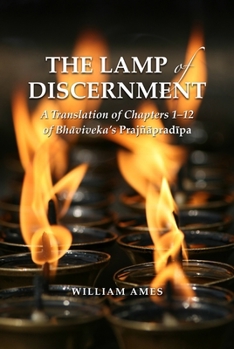The Lamp of Discernment: A Translation of Chapters 1-12 of Bhāvaviveka's Prajñāpradīpa
(Part of the Contemporary Issues in Buddhist Studies Series)
The Buddhist thinkers of medieval India addressed many of the issues that are still central to Buddhist praxis in the present. One of the most important of those thinkers is Bhāviveka, author of the work known as the Praj āpradīpa. Over several years, William (Bill) Ames translated, carefully and precisely, the first twelve chapters of that work, which he has compiled and revised for consistency in this volume.
The Praj āpradīpa is a commentary on Nagārjuna's famous, and in the view of many famously difficult, Mūlamadhyamakārikā--Root Verses on the Middle Way. Central to all Buddhist thought in one form or another is an understanding that the common entities of our experience are transitory and, therefore, unreliable as grounds upon which to base our own happiness, satisfaction, security, and even our own sense of self. As Ames explains in his Introduction, the Madhyamaka pursues this insight further, asserting that all existing entities are lacking in (empty of, śūnyatā) any "intrinsic nature (svabhāva)." As systematized by later Tibetan scholastics, the Madhyamaka school is understood to have developed into two different forms, the Svātantrika and the Prāsaṅgika, a textbook style simplification that has had lasting influence. In this intellectual historiography where movements require specific founders, Bhāviveka is identified as the founder of the Svātantrika. Part of the neo-Romantic rhetoric popular in the second half of the twentieth century was that meditation practice was by itself capable of leading to full awakening, or rather to an unimpeded, direct experience of the true and the real. That view has become increasingly untenable, as meditators have themselves attempted to understand the significance of their own experiences. Those who have turned to the teachings of the Buddhist tradition for that understanding are often confronted by the (only) apparent difficulty of understanding emptiness. Ames' translation of this key work of the Madhyamaka school can contribute to untangling much of the confusion surrounding these ideas.Format:Hardcover
Language:English
ISBN:1886439699
ISBN13:9781886439696
Release Date:December 2019
Publisher:Institute of Buddhist Studies
Length:486 Pages
Weight:1.85 lbs.
Dimensions:1.6" x 6.1" x 9.2"
Customer Reviews
0 rating





